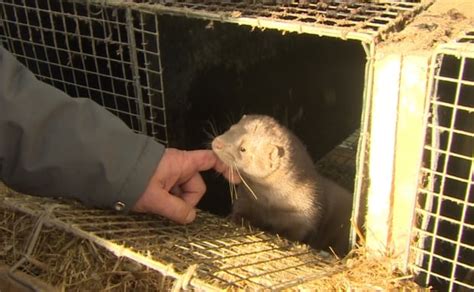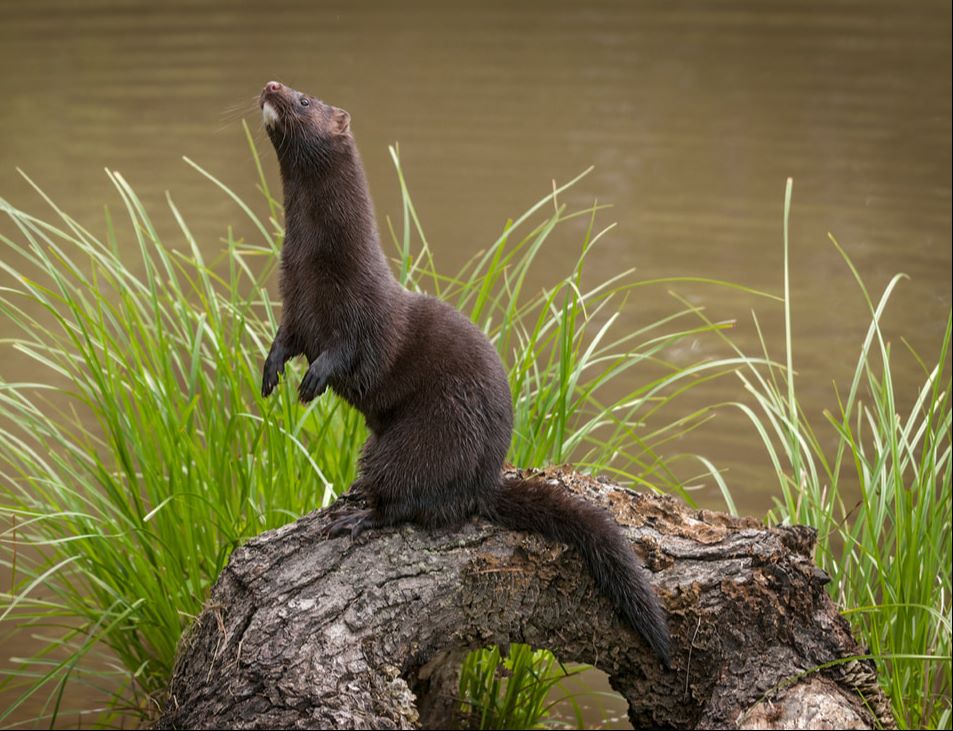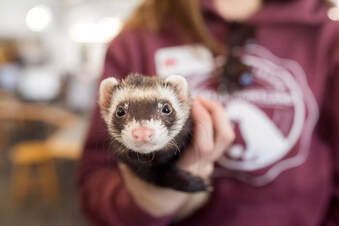 Farm mink Farm mink Aug 18-USA: The first cases of novel coronavirus found in minks in the United States were reported in Utah, according to multiple reports. The United States Department of Agriculture's National Veterinary Service Laboratory announced that all five cases were found at two mink farms in Utah. Necropsies were performed on several dead minks from the farms by the Utah Veterinary Diagnostic Laboratory after receiving exceptionally high reports of mink fatalities, the agency stated in the release. Both farms have been completely quarantined, according to a news release from the Utah Department of Agriculture and Food. Mink, like their close relatives, ferrets, are known to be susceptible to coronavirus, and like humans, they can show a range of symptoms, from no signs of illness at all to severe problems, such as pneumonia. Scientists suspect the virus spreads in mink farms through infectious droplets, on feed or bedding, or in dust containing droppings. Mink have caught the virus from humans, but genetic detective work has shown that in a small number of cases the virus seems to have passed the other way, with the virus spreading from mink back to humans. Mink have become "reservoirs for the virus" and surveillance is required in other wild and domestic animals that may be susceptible, said Prof Joanne Santini of University College London. Since the pandemic started, Europe has witnessed the spread of corona virus to mink farms in Europe, including Denmark, the Netherlands, and Spain have now triggered the culling of millions of farmed mink. Spain culled 100,000 mink in July after cases were detected at a farm in Aragón province, and tens of thousands of the animals were slaughtered in the Netherlands following outbreaks on farms there. Denmark is the world's biggest producer of mink fur and its main export markets are China and Hong Kong. In early November, Denmark stated that it would cull all its mink - as many as 17 million - after a mutated form of coronavirus that can spread to humans was found on mink farms. The culling began late last month, after many mink cases were detected. But cases are spreading fast in Denmark - 207 mink farms in Jutland are affected - and at least five cases of the new virus strain were found. Twelve people had become infected, the authorities said. Concerns were raised after Danish authorities found genetic changes they stated might undermine the effectiveness of future Covid-19 vaccines. As of the date of reporting, over 200 people have been infected with mink-related coronavirus. The UK responded by imposing an immediate ban on all visitors from Denmark amid concerns about the new strain. Danish scientists are particularly concerned about one mink-related strain of the virus, found in 12 people, which they say is less sensitive to protective antibodies, raising concerns about vaccine development. Soumya Swaminathan, chief scientist of the World Health Organization (WHO) stated: "We need to wait and see what the implications are but I don't think we should come to any conclusions about whether this particular mutation is going to impact vaccine efficacy.” "What we do know is that the mink are picking up the virus from people; they can be infected and they are spreading it between themselves and it's come back to humans." Studies are under way to find out how and why mink have been able to catch and spread the infection. End of the Fur-Trade? Claire Bass, executive director of Humane Society International/UK, said in addition to animal suffering, the potential for disease spread is another reason for all fashion companies to go fur-free and for governments to shut down "this dirty trade." "We urge the Netherlands and other countries in the process of phasing out fur farming to speed up their industry closures, and countries yet to commit to bans, including China and Finland, to do so now." In August, the Dutch parliament voted for a permanent closing of the mink fur farms shut down due to COVID-19 outbreaks among workers and animals, and to close down remaining farms this year. Since a vote in 2013, Dutch mink fur farming under a slow phase out, to close entirely by the beginning of 2024. The spread of COVID-19 among mink across multiple farms since April resulted in at least two workers catching the virus from the animals and triggered calls for the government to rapidly shut down the industry. “Waiting until 2024 for the mink ban to take effect would have been unjustifiable and irresponsible,” says Sandra Schoenmakers, director of Dutch anti-fur organizations Bont voor Dieren. Animal welfare campaigners are celebrating the outcome of the vote after pushing for the early closure of the mink fur industry ahead of a nationwide ban due to come into effect in 2024. Poland, one of the world’s top producers of mink fur with some 350 mink farms containing around 6 million animals or roughly half of that in Denmark, started Covid testing on minks on Nov 17. Sources: https://www.bbc.com/news/science-environment-54842643 https://www.businessinsider.com/denmark-mink-covid-19-mutation-cull-minks-restart-coronavirus-pandemic-2020-11 https://www.reuters.com/article/health-coronavirus-poland-mink/poland-tests-mink-for-covid-despite-fur-industrys-objections-idUSL8N2I34O6 https://www.who.int/csr/don/06-november-2020-mink-associated-sars-cov2-denmark/en/  Nov 5-New York City: Results from a recent study in domestic ferrets conducted at Columbia University, NY, showed that a drug delivered by nasal spray could block the absorption of the SARS-CoV2 virus, preventing Covid-19. (Brian Hews - New York Times; Nov 5, 2020). More importantly the test drug does not require refrigeration and is expected to be relatively inexpensive. Ferrets are used by scientists studying flu, SARS and other respiratory diseases because they can catch viruses through the nose much as humans do, although they also infect each other by contact with feces or by scratching and biting. See: Covid 19 and Ferrets Covid Mar 22, 2020. Six ferrets were used in the study, divided into pairs in three cages: one group received the test drug, one group received a “placebo” (no drug) spray, one ferret was deliberately infected with SARS-CoV-2 but received no spray a couple of days earlier. After 24 hours together, none of the ferrets that received the spray drug caught the disease, whereas all the placebo-treated ferrets became infected. Scientists stated that the spray attacks the virus directly. It contains a lipopeptide, a cholesterol particle linked to a chain of amino acids, the building blocks of proteins. This particular lipopeptide exactly matches a stretch of amino acids in the spike protein of the virus, which the pathogen uses to attach to a human airway or lung cell. The medical team has applied to the federal government for funding to initiate studies in people. Source: https://www.nytimes.com/2020/11/05/health/coronavirus-ferrets-vaccine-spray.html |
Details
Archives
April 2024
Categories
All
|
|
Terms and Conditions
|
allFerrets® 2014-2024. ALL RIGHTS RESERVED.
Proudly designed by widgIT |



 RSS Feed
RSS Feed
